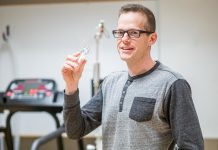November 2008 - Low-dose aspirin as primary prevention did not appear to significantly reduce the risk of a combined end point of coronary, cerebrovascular and peripheral vascular events in patients with type 2 diabetes, according to a new study in JAMA. However, aspirin did significantly reduce the combination of fatal coronary and fatal cerebrovascular events. The article is being released early online Sunday, November 9 to coincide with its scientific presentation at the American Heart Association meeting. The study will appear in the November 12 print issue of JAMA.
"Diabetes mellitus is a powerful risk factor for cardiovascular events," the authors write. "Individuals with diabetes have a two- to four-fold increased risk of developing cardiovascular events than those without diabetes." The authors note that the "American Diabetes Association recommends use of aspirin as a primary prevention strategy in patients with diabetes who are at increased cardiovascular risk," including those who are older than 40 years or who have additional risk factors, such as family history, hypertension or smoking.
In this study conducted by Hisao Ogawa, M.D., Ph.D., from the Graduate School of Medical Sciences, Kumamoto University, Japan and colleagues from the Japanese Primary Prevention of Atherosclerosis with Aspirin for Diabetes (JPAD) Trial Investigators, the researchers examined whether low-dose aspirin would be beneficial for primary prevention of atherosclerotic (atherosclerosis, which involves narrowing or hardening of the arteries because of plaque build-up) events in patients with type 2 diabetes.
From Dec. 2002 through April 2008, 2,539 patients with type 2 diabetes and no history of atherosclerotic disease from 163 institutions from throughout Japan were enrolled in the study. Patients were randomly assigned to the low-dose aspirin group receiving 81 or 100 mg per day (n = 1,262) or the nonaspirin (n = 1,277) group. The average age was 65 and 55 percent of the patients were men. The median (midpoint) follow-up period was 4.37 years. The main outcome measures were atherosclerotic events, including fatal or nonfatal ischemic heart disease, fatal or nonfatal stroke, and peripheral arterial disease.
"A total of 154 atherosclerotic events occurred: 68 in the aspirin group and 86 in the nonaspirin group," the researchers write. "In the 1,363 patients aged 65 years or older (719 in the aspirin group and 644 in the nonaspirin group), the incidence of atherosclerotic events was significantly lower in the aspirin group (45 events, 6.3 percent) than in the nonaspirin group (59 events, 9.2 percent)." In the 1,176 patients younger than 65 the difference among events in the two groups was not significant.
Continue Reading Below ↓↓↓
Aspirin was well tolerated: in comparing bleeding events, the researchers reported 13 hemorrhagic strokes, with no statistically significant difference between aspirin takers and non-takers (six such strokes in the aspirin group; seven in the non-aspirin group). There was a comparable number of the combined endpoint of serious hemorrhagic events (hemorrhagic strokes and major gastrointestinal bleeds).
"Myocardial infarction [heart attack] and ischemic stroke are leading causes of mortality and morbidity in patients with type 2 diabetes. Given the rapid increase in the number of patients with type 2 diabetes worldwide and especially in Asia, establishing effective means of primary prevention of coronary and cerebrovascular events is an important public health priority," the authors comment.
While this study did not find that low-dose aspirin significantly reduced the risk of atherosclerotic events in primary prevention therapy in patients with type 2 diabetes, the authors suggest more research is needed. "These findings should be interpreted in context with the low incidence of atherosclerotic disease in Japan and the current management practice for cardiovascular risk factors and suggest the need to conduct additional studies of aspirin for primary prevention of cardiovascular disease in diabetic patients."
JAMA. 2008;300 [18]: 2134-2141
This study was supported by the Ministry of Health, Labour and Welfare of Japan. Please see the article for additional information, including other authors, author contributions and affiliations, financial disclosures, funding and support, etc.
Editorial: Aspirin For Primary Prevention � Still an Open Question for Patients with Diabetes
"The use of aspirin for primary prevention of cardiovascular events in individuals with diabetes is widely recommended by existing guidelines, but the evidence supporting its efficacy is surprisingly scarce," writes Antonio Nicolucci, M.D., from Consorzio Mario Negri Sud, Italy, in an accompanying editorial.
"The lack of precision and the low statistical power in the JPAD trial are the consequence of the substantially lower than expected event rate in the trial population." Dr. Nicolucci writes that the study population had a very low baseline risk of cardiovascular events and questions whether the results can be generalized to other populations with substantially higher cardiovascular risks.
"The issue of aspirin therapy for patients with diabetes is an example of how, in the presence of a long-lasting uncertainty, scientific organizations or governmental bodies should provide the foundation for answering this question by promoting pragmatic, large-scale clinical trials. Considering all diabetic patients with no history of cardiovascular disease (except those with documented contraindications or perceived indications) as candidates for randomized clinical trials would represent a major contribution to the credibility of scientific methods in guiding practice."
JAMA. 2008;300 [18]: 2180 � 2181
Dr. Nicolucci reported being the principal investigator of the Aspirin and Simvastatin Combination for Cardiovascular Events Prevention Trial in Diabetes (ACCEPT-D) trial, a nonprofit trial supported by the Italian Drug Agency (AIFA). He reported receiving research grants from Bayer in the past.
Source: American Medical Association (AMA)
Continue Reading Below ↓↓↓









